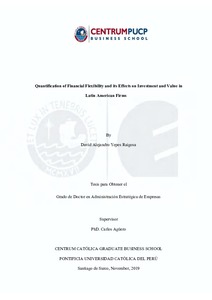Quantification of financial flexibility and its effects on investment and value in Latin American firms
Abstract
This research introduced a newfangled and continuous calculation for unused debt capacity as
a ratio (UDC), which allowed developing and assessing the financial slack ratio (FSR) as a
new proxy of FF. FSR combined the cash holding and unused debt capacity as sources of FF
because the firms can independently develop their leverage and cash policies. This study
tested the effects of FSR on investment and value for Latin American companies during crises
(2008-2009 and 2014-2016) and non-crisis periods (2005-2007 and 2010-2013). The
outcomes showed that FSR had positive effects on investment and value of firms, reduced the
sensitivity of investment to cash flow, and evinced that firms with higher FSR experienced a
lower decreasing on their value than firms with lower FSR during crises. This empirical
evidence validated that FSR is a quantifiable proxy of FF and showed the strengths of FSR
respect to other proxies for FF by several tests. The new calculation for UDC and FSR often
applied to firms without debt rating. This research of quantitative, empirical approach, unexperimental
longitudinal design, the explanatory scope used quantitative yearly information
of publicly traded firms from Latin America between 2005 and 2016.
Temas
Finanzas
Para optar el título de
Doctor en Administración Estratégica de Empresas
Collections
The following license files are associated with this item:





